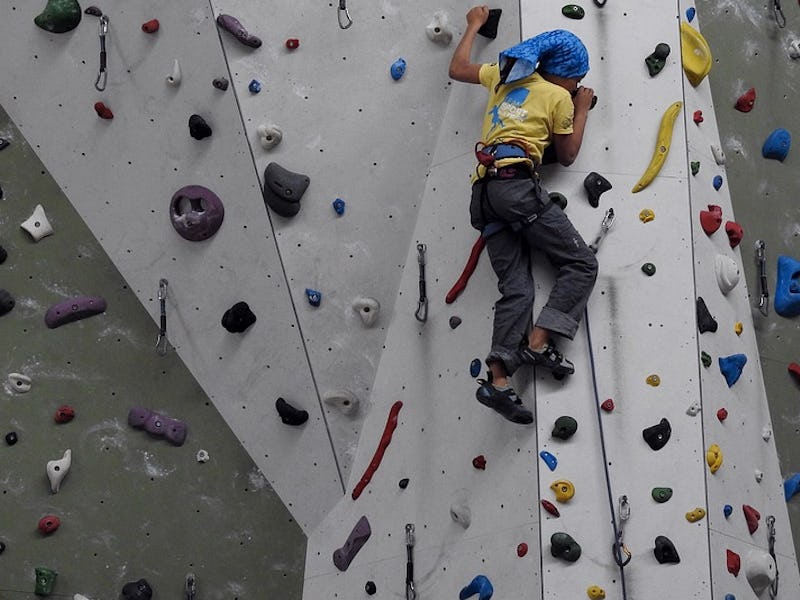Scientists Find That Rock Climbing Can Treat Depression
Bouldering has incredible results.

There are more American rock climbing gyms now than there’s ever been, and the popularity of indoor climbing doesn’t appear likely to slow down any time soon. That’s good news for climbing enthusiasts, and for mental health advocates who argue that bouldering — climbing without ropes or a harness — can be used as an effective treatment for depression.
In a recent study presented at the Association for Psychological Science Convention, a team of American and German psychologists argue that bouldering can be used as a psychotherapeutic intervention. While some German psychiatric hospitals already use rock climbing as therapy, this study is the evidence that it is actually a successful treatment: The team explains in BMC Psychiatry that climbing resulted in their study participants improving from being severely depressed to demonstrating “moderate to mild depression levels.”
“I hope this study and future studies are able to impact a life,” study co-author Eva-Maria Stelzer, a researcher at the University of Arizona, said in a statement. “Depression is a severe illness. Even though a variety of treatment options exist, less than one-third of people receive treatment for their symptoms.”
A total of 47 participants participated in this study and were split into two groups. One group immediately began bouldering therapy, and the other was put on a waitlist. Each study participant was either diagnosed with depression by a psychiatrist, or had scored less than 13 points on the World Health Organization depression scale. Approximately half the participants were also undergoing psychotherapeutic treatment in addition to this study, and nearly 70 percent utilized anti-depressive medication.
Bouldering was an effective therapy for depression.
The intervention group immediately began participating in eight weekly sessions of bouldering that were each for three hours. Every session began with a short mediation or mindfulness exercise, the pscyho-educational theme of the session would be briefly discussed (like “how to cope with anxiety”), and then a bouldering session that would precede led by mental health therapists trained in “therapeutic rock climbing.” Each session would also end with another mindfulness mediation and a discussion of that day’s experience.
After eight weeks, the groups switched out and the originally waitlisted group went through the same process. At the end of the study, the participants were asked to complete the Beck Depression Inventory survey, a symptom checklist, and questionnaire on depression and self-management skills. The researchers found that the group that immediately began the rock climbing training improved their scores on the Beck Depression Inventory by 6.27 points, while the waitlisted participants only improved by 1.4 points as they waited for their own session to begin. When this group started climbing, their scores massively improved as well, which was evidence to the researchers that bouldering therapy was an effective one.
A woman boulders at an indoor gym.
The researchers believe that these results emerged because bouldering combines the benefits of group therapy, social interactions, and physical activity. While psychologists have yet to embrace physical activity as therapy, numerous studies have confirmed that it does yield beneficial, psychotherapeutic results. When people exercise “feel-good” brain chemicals like endorphins are released, immune system chemicals that worsen depression are reduced, and body temperature rises, which is believed to have a calming effect.
“In contrast to most studies in which exercise interventions consisted of running or aerobics, aimed at improving or maintaining one or more components of physical fitness, bouldering focusses in particular on mental aspects,” the researchers write. “For this reason, bouldering may be especially interesting as a therapeutic tool since many people with depression have poor physical health, low levels of fitness and physical self-worth, and less motivation for heavy physical effort.”